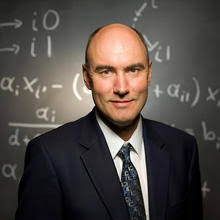Martin A. Nowak is Professor of Mathematics and of Biology at Harvard University and Director of the Program for Evolutionary Dynamics. He works on the mathematical description of evolutionary processes, including the evolution of cooperation and human language, as well as the dynamics of virus infections and human cancer. His major scientific contributions and discoveries include: a proposed mechanism of HIV disease progression; the rapid turnover and evolution of drug resistance in HIV infection; quantifying the dynamics of HBV infection; evolution of virulence under superinfection and coinfection; the role of chromosomal instability in human cancer; quantifying the dynamics of chronic myeloid leukemia; the accumulation of drivers and passengers in cancer progression; the evolution of drug resistance in targeted cancer therapy; the mechanisms for the evolution of genetic redundancy; “generous tit-for-tat” and “win-stay, lose-shift”; the alternating Prisoner’s Dilemma; the evolution of cooperation by indirect reciprocity; spatial game dynamics; adaptive dynamics; evolutionary game dynamics in finite populations; evolutionary graph theory; five mechanisms for the evolution of cooperation; evolution of eusociality by natural selection; a mathematical approach for studying the evolution of human language; culturomics; “winners don’t punish”; prelife; and the origin of evolution.
An Austrian by birth, he studied biochemistry and mathematics at the University of Vienna with Peter Schuster and Karl Sigmund. He received his Ph.D. sub auspiciis praesidentis in 1989. He went on to the University of Oxford as an Erwin Schrödinger Scholar and worked there with Robert May, the later Lord May of Oxford, with whom he co-authored numerous articles and his first book, Virus Dynamics (2000). Nowak was a Junior Research Fellow at Wolfson and later Keble College. He was a Wellcome Trust Senior Research Fellow. Nowak became head of the mathematical biology group at Oxford in 1995 and Professor of Mathematical Biology in 1997. A year later, he moved to Princeton to establish the first program in theoretical biology at the Institute for Advanced Study. He moved to Harvard University in 2003.
A corresponding member of the Austrian Academy of Sciences, Nowak is the recipient of the Weldon Memorial Prize of Oxford University, the David Starr Jordan Prize of Stanford University, and the Akira Okubo Prize of the Society for Mathematical Biology. Nowak is the author of over 450 papers and four books. Evolutionary Dynamics (2006) provides an overview of the powerful yet simple laws that govern the evolution of living systems. SuperCooperators (2011) argues that cooperation is the third fundamental principle of evolution beside mutation and selection.




